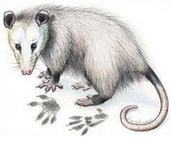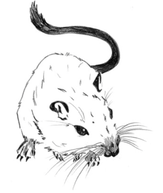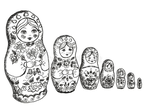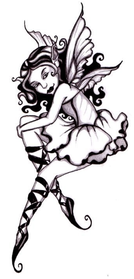 English-speaking settlers on the continent learned a bunch from Algonquian-speaking inhabitants, & this learning didn’t stop centuries ago. Here are a few of the Algonquian words that have become part of English. In 1610, the word opossum (or simply possum) came to English from the Powhatan branch of Algonquian. The original word translates to white dog. The Mikmak branch of Algonqiuan gave us the word caribou in the 1660s. The original word translates to pawer or scratcher, due to the caribou’s habit of pawing through the snow to find edible moss and grass. Just south of Boston is the Great Blue Hill. Before Europeans muscled into the area, an Algonquian-speaking group of people lived there. Their native neighbors referred to them as the people at the large hill, or Massachusetts. Though the people at the large hill sadly no longer exist, the name remains. In the 1670s, English speakers started using the word woodchuck, which comes from the Cree branch of Algonquian & originally referred to the marten, a rodent inclined to live in forests. The Cree word was otchek, but because martens lived in trees, European settlers heard something closer to woodcheck, thus ending up with woodchuck. Most branches of Algonquian had a word meaning shoe, which sounded something like mocassin. In 1610, English speakers started using the word to refer to a soft leather shoe lacking a stiff sole. An inland group of Algonquian speakers labeled a particular hunk of land the place of the wild onion — which sounded something like shekakoheki. In 1833, English speakers learned this word from the French trappers in the area, & made use of it to name that area Chicago. In 1629, an Algonquian word meaning that which is ground or beaten made its way into English to refer to parched corn — so we have the word hominy. We all know the famed location of Orville & Wilbur Wright’s first flight is Kitty Hawk, but the place name had nothing to do with cats, kitties, or raptors — it’s a brutally Anglicized version of the Algonquian place name, which first occurred on English maps as Chickehawk. Nobody’s certain what the original Algonquian name was, or what it meant. Historically, English speakers showed little respect to the many speakers of the various branches of Algonquian. Perhaps we can show a bit of respect now by (at the very least) recognizing the source of some of our English words. My thanks go out to this week’s sources, Merriam Webster, Carolina Designs, Collins Dictionary, Etymonline, & Wordnik.
4 Comments
 A sizable number of English words come either from or through Arabic. Here’s a tiny sampling. In the 1660s, English speakers started using the word yarbuah, which referred to a mouselike rodent of Africa & Asia Minor, called exactly that in Arabic. But in 1849, yarbuah was eclipsed by a version of yarbuah that travelled through Latin & French on its way to English, but still came from the original Arabic word. Thus, we have gerbil. In the 1670s alcove (a vaulted recess) made its way to English from Arabic through Spanish & French. Demi-tasse (a small cup of black coffee or the cup in which it is served) came to English from Arabic through French in 1842. Our English word ghoul comes from an Arabic word meaning evil spirit that robs graves & feeds on corpses. Ghoul showed up in English in 1786. The first two syllables of Guadalcanal come from an Arabic word meaning river. Guadalcanal first appeared in English in 1568. The first two syllables of Guadalupe came from the same Arabic source in the same year. In about 1600, English speakers began using the word henna, which came from the Arabic word hinna, the name of the small thorny tree from which henna dye is extracted. In 1600 the originally Arabic word gazelle arrived in English after a linguistic tour through North Africa, Spain, and France. Tarragon arrived in English in the 1600s. Though it started out as a Greek word, it came to English through Arabic. The originally Latin word tuna spent a bunch of time in Arabic & Spanish before making its way into English in 1881. And in other tuna news, the word albacore came through Portuguese from an Arabic word that translates literally to milk-cow (due to the albacore’s substantive size). The word sofa showed up in English in the 1620s from Arabic through Turkish. Were any of these words a surprise? I’d love to hear from you. My thanks go out to this week’s sources, Merriam Webster, Collins Dictionary, Etymonline, & Wordnik.  Hindi, which is spoken in India & many other places, has given English speakers some great words. The word loot arrived in English in 1849 from a Hindi word meaning booty or stolen property. Hindi speakers got this word from Sanskrit. In HIndi, a payndit is a learned master or teacher. By the 1670s, this word oozed into English as pundit, a person who offers opinions in an authoritative manner. Pajamas (& pyjamas) came to English in 1800 from a Hindi word meaning loose trousers tied at the waist. Pajamas came to Hindi from a Persian word meaning leg clothing. In 1851 bloke arrived in English. Etymologists haven’t nailed down its source, but the two frontrunners are a Celtic word meaning a large, stubborn person, & a Hindi word meaning a man. Hindi speakers got the word kamarband from Persian, which by 1610 made its way to English as cummerbund, a loose sash worn as a belt. Bandana made its way to English in 1752 from a Hindi word referring to a method of dyeing. This word came from a Sanskrit word meaning bind — perhaps the method of dyeing in question was something like our modern tie-dye. In 1859 the word nark or narc came to English — an informer, not from narcotics. Its most likely source is a Romany word which came from a Hindi word meaning nose. The punch that refers to a type of mixed drink appears to have come from the Hindi word for the number five — reportedly the number of ingredients in the first punch. This particular meaning of punch came to English in the 1630s. The word cot, a small, light, bed, first appeared in English in the 1630s from a Hindi word meaning couch or hammock. In 1915, the Hindi word meaning pleasant, happy, & healthy, gave us the word cushy. Interestingly, it has no relationship to the word cushion. We English speakers owe a thank you note to the Hindi-speaking world. For which of these words do you feel most grateful? My thanks go out to this week’s sources, Merriam Webster, Collins Dictionary, Etymonline, & Wordnik.  The Russian language is not responsible for the Russian government's actions, but it is responsible for heaps of English words that come from Russian. Most those words are no surprise at all: borzoi cosmonaut babushka Bolshevik ruble balalaika tundra commisar stroganoff samoyed vodka tsar pogrom Kalashnikov gulag Then there are Russian words that made their way through Yiddish before arriving in English: The Russian word blinyets -- meaning little pancake -- became the Yiddish word blintze, which in 1903 became the English word blintz. The Russian word knysh — a type of cake — became the Yiddish word knish, which arrived unchanged in English in 1930. The Russian word latka — a patch — was figuratively used to refer to a pastry. This figurative meaning made its way into Yiddish, then became the English word latke in 1925. Some words made it to English from Russian in other ways: Parka made its way to English in 1780 through Aleut. The Sanskrit word sramana-s referred to a Buddhist ascetic. By the 1690s it landed in English as shaman, but not before a wild linguistic road trip through Prakrit, Chinese, Tungus, and — of course — Russian. Yurt — a house or hut — came from one of the Turkic languages, then spent centuries in Russian before getting to English in 1784. Last but not least, etymologists are pretty sure the word hamster — first appearing in English in 1600, & replacing the inelegant term German rat — comes from a mash-up of the Russian word for the Asian rodent cricetini & the Lithuanian word for ground squirrel. Which of these sounds least Russian to your ear? My thanks go out to this week’s sources, Merriam Webster, Collins Dictionary, Etymonline, & Wordnik.  It’s no surprise that English has appropriated some of its words from Korean. Other English words didn’t come from Korea at all, but managed to come through Korea. Here are a few. Taekwondo came to English in 1967. It’s made up of three words from the Korean language: tae =kick + kwon = fist + do = art, way or method. Kimchi, a spicy, pickled, vegetable mixture, appeared in English in 1898 from Korean. Skosh is a Japanese word meaning few, little, or some. American forces introduced skosh to English during & after serving in the Korean War. American forces during the Korean War also gave us the precipitous retreat meaning of the word bug -- let’s bug outta here! Though the word chopper (one who chops) has been a part of the English language since 1550, it was members of the American military during the Korean War who began using chopper to refer to a helicopter. In Chinese, xi nao means attempt to alter the thoughts of another through psychological techniques. American military members in Korea during the Korean War directly translated this Chinese figure of speech to English, giving us the word brainwash. Though it would be reasonable to assume the Korean word mani (a large number of people or things) might be the root of the English word many (a large number of people or things), these words developed separately from one another & have no etymological relationship at all. Funny how these pressing issues never quite get into the news feed eh? My thanks go out to this week’s sources, Merriam Webster, Collins Dictionary, Etymonline, & Wordnik.  Most of us can imagine the logic that would lead an ancient verb meaning to leanto give birth to these words: lean ladder lid low decline incline recline declivity Though it’s a bit of a logical stretch, most of us can also invent a path for this ancient word meaning to lean to have given us the word climax. Some less likely siblings of lean’s precursor, though, need a bit of explanation. When the word climate appeared in English in the 1300s, it came from this same ancient root because climate referred to horizontal zones on the earth’s surface, measured against the slope (or lean) of the globe’s surface. Within a century, scientists began to focus more on the weather in those zones than on the land itself, & climate began its ooze into its modern usage. Also in the 1300s, English borrowed a word from Anglo-French to mean one who lives under the patronage of another (one who leans on his/her patron) — client. This Anglo-French word also came from that ancient word meaning lean, & within a century assumed the meaning a lawyer’s customer. Two centuries later, client’s meaning broadened to mean any businessperson’s customer. Because a person tends to lean before completely taking to bed, in the early 1600s a related word began to mean a bedridden person. Soon, the word began to refer to a medical facility housing bedridden people, & so today we have the word clinic. For those who are wondering, the lean that means thin, spare, with little flesh or fat came from an entirely different source & has nothing to do with all this. I’d love to hear whether any of these leaning words surprised you. My thanks go out to this week’s sources, Merriam Webster, Collins Dictionary, Etymonline, & Wordnik.  The Proto-Indo-European word *wer- meant to watch out for or perceive. It gave us the words aware, beware, wary, & guard. *Wer- also gave us some words that define some of the things people might be wary of losing: wares, warehouse, & reward And some words that involve storing or protecting those wares: wardrobe, steward, reverend, warden, & guard (the noun) It even gave us the word lord, which in the lower case refers to he who guards the loaves & in the upper case can refer to a British noble, or in Christianity, God. Then there are *wer-’s offspring that help label how we might look up to those who watch over things for us: regard, revere, & reverence And what would we do without outliers? These unlikely words also grew out of this same fruitful root: hardware, panorama, avant garde, & software To confuse matters even more, this is only one of the four Proto-Indo-European *wer-s linguists have identified. The other three meant to cover, to bend, & to lift. Ah, Language. Nothing like it, eh? My thanks go out to this week’s sources, Merriam Webster, Collins Dictionary, Etymonline, & Wordnik.  Etymologists work hard studying languages. This study involves the proposal of languages that appear to have existed & can be built based on the products of these languages’ progeny. One such proposed source language is Proto-Indo-European, & one of the root words etymologists believe came from this proposed language is a word meaning speak. Though this root word was never written when this proposed language was spoken (assuming it was spoken), we write the root *wekw-. It appears to have given birth to a steaming heap of English words. After passing through Latin, this word meaning speak gave us: vociferous - 1600s vocabulary - 1500s avocation - (we also refer to an avocation as a calling — & isn’t a calling voiced?) 1400s After passing through Latin, Old French & Anglo-French: vouch - 1300s After passing through Latin & Old French: voice - late 1200s vowel - 1300s vocal - late 1300s invoke, revoke, provoke, & evoke — 1400-1600s convocation - 1300s advocate - 1300s equivocate - late 1300s And after passing through Greek & Latin: epic - 1500s All that from the idea of speaking up. For most of us in the US of A, voting day is upon us. Speak up. My thanks go out to this week’s sources, Etymonline.com, Merriam-Webster.com, Wordnik, Collins Dictionary, & the OED.  I find the word grammar & its siblings to be somewhat beguiling. Grammar appeared in English in the late 1300s, meaning the rules of Latin. It came from an Old French word meaning Latin learning. And that Old French word came through Latin from a Greek word meaning the art of letters & learning. Because the art of letters & learning involved pulling meaning from little marks on paper, & this act was something done only by a small & somewhat secretive percentage of the population, such pursuits were sometimes seen by the masses as both more-than-human & less-than-wholesome, so the word grammar also meant, magic, spells, & mumbo-jumbo. By the 1500s, the Latin learning meaning generalized to mean rules of a language to which speakers must conform. The mumbo-jumbo meaning made its way to become the word gramary, meaning magic, necromancy, or occult learning. When the Scots got hold of this word, it became the word glamour, initially meaning a magical spell or charm, & then morphing to mean charming or beautiful, sometimes dependent on artifice. And in 1849 English adopted the French word grimoire (from that magic, spells, & mumbo-jumbo meaning). A grimoire is a manual for invoking demons & spirits of the dead. And because all things grammar have to do with writing, the suffix -gram also comes from grammar, giving us telegram, anagram, hologram, mammogram, & a host of others. Who would’ve thought? My thanks go out to this week’s sources, Merriam Webster, Collins Dictionary, Etymonline, & Wordnik.  A lot of people think modern English is a bit of a hot mess. Truth is, English has been a full-on hot mess since well before it became modern, and so were any number of languages from which English has pilfered over the centuries. One of the many poster children for the English-is-a-Hot-Mess argument is the tiny, simple, prefix in-. English speakers borrowed in- (meaning not) from Latin, giving us words like ineffective, inedible, & inaccurate. Because any number of sounds are hard to pronounce directly after the letter n, in- also gave us words like impossible, immobile, illiterate, illegitimate, irreversible, & irreverent, all from that borrowed Latin prefix in-. Around the same time, English speakers also borrowed a Latin prefix that meant into, in, upon, or on. And of course, it was spelled in-. This prefix gave us words like investigate & intrude. Because of the same pronunciation challenges, this prefix also gave us. immemorial, illuminate, & irradiate, and more. And English speakers also borrowed a third Latin prefix meaning thoroughly. This prefix is spelled — what a surprise ! — in-, & gives us words like inflammable. So that one tiny English prefix can either negate what follows it, clarify what follows it, or amplify what follows it. Helpful, eh? Author Brené Brown tells us “Kindness is clarity.” Perhaps we can find English’s kindness in the pronunciation end of this sad tale of woe. At least we’re not all stumbling over trying to say inmobile, inlegitimate, inradiate, inreverent, & inluminate. Kind readers, I hope you’ll add an in- word or three to this list in the comments section. Big thanks to a Wordmonger follower for suggesting this subject, & big thanks to this week’s sources, Etymonline, the OED, Merriam Webster, & Collins. |
I write for teens & tweens, bake bread, play music, and ponder the wonder of words in a foggy little town on California's central coast.
To receive weekly reminders of new Wordmonger posts, click on "Contact" & send me your email address. Archives
November 2023
|


 RSS Feed
RSS Feed